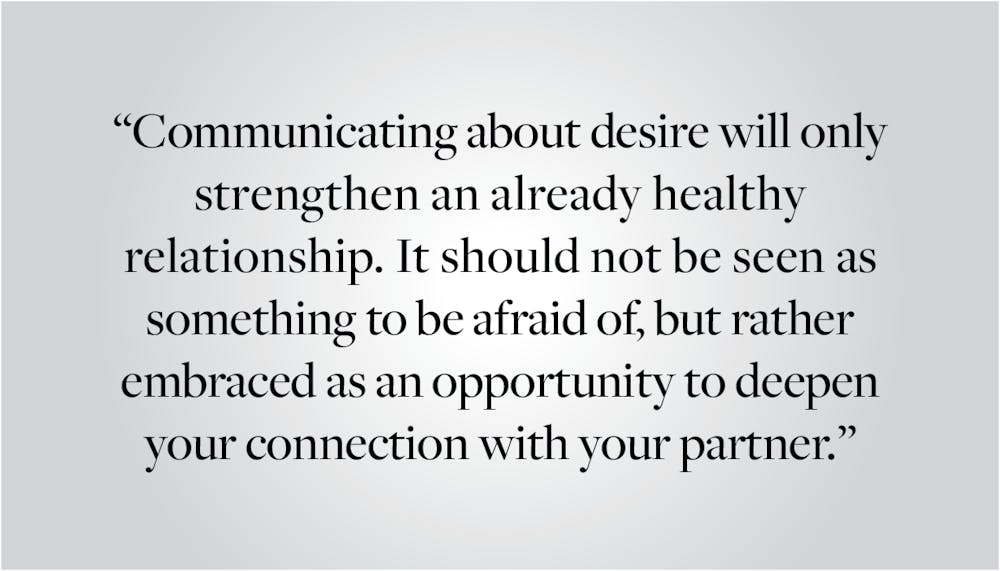In the bubble of college, relationships may seem easy or uncomplicated. What is difficult about two young people falling in love? Turns out, a myriad of issues can arise. I received a question through my virtual anonymous questions form that piqued my interest: How do you address a difference in sex drive in a relationship? A recent study showed that up to 80% of couples struggle with this issue — a situation where partners’ sexual desires are misaligned. But this mismatch doesn’t need to mean the end of a relationship, so long as both partners commit to open, honest and empathetic communication.
Any level of sex drive is perfectly normal. Everybody has different and fluctuating levels of desire. It can be difficult to express our needs to a sexual partner, but communication is paramount. A healthy relationship does not involve one partner pressuring the other to have sex. While one partner may feel sexually frustrated, it is never okay to take out that frustration on the other person. It might be valuable to want to please a romantic partner, but it is important to be able to distinguish our own sexual desire from a desire to satisfy someone else.
If your partner has a lower sex drive than you, it may feel like you’re the problem. A sexual desire discrepancy can sometimes be symptomatic of larger issues in a relationship. Figuring out if this is the case is difficult but necessary for long-term happiness. However, it is not always true that a larger problem is causing a desire mismatch, especially if your partner has expressed otherwise. There are many factors that can cause lower or higher sex drives. Some of them are innate to a person, while other factors, such as fluctuating stress levels, health conditions, overall well-being, hormone levels and certain medications, are not. Investigating what external factors might be affecting your sex drive could allow you to clarify what might be causing a desire discrepancy in your relationship.
A mismatched sex drive can be frustrating for both partners in an otherwise fulfilling relationship. When the only big point of contention in a relationship is a factor that neither partner can control or reliably change, it can feel like a dead end. The partner with the lower sex drive can feel like they are not giving their partner what they need, while the partner with the higher sex drive can feel undesirable or unwanted. Both of these insecurities stem from feeling that you’re not enough, and acknowledging that this issue affects both partners can be a good thing. It is important to be able to talk about your emotions and desires openly, especially in the context of an intimate relationship.
When your partner becomes synonymous with your own feelings of not being enough, it can be difficult to focus on your relationship outside of that negativity. However, I don’t think this issue is inherently relationship-ending. Be sure to constantly check in with yourself about your emotions and express how you are feeling instead of pushing them under the rug. This is the first step to creating a healthier bond between you and your partner.
It can also be helpful to figure out what individually brings you and your partner sexual pleasure and how you can incorporate some of those things into your sex life together. Sex does not have to meet one set definition. Maybe your partner is uninterested in one type of sex, but not in another. There are certain things that you cannot know about your partner’s desires without discussing them.
And just remember, while sex is important, it is not everything in a relationship. There are many factors that contribute to a healthy relationship, including quality time together. Sex is not the only way to feel physically and emotionally close to your partner. Figuring out what else you can do together that makes you feel that way is important. And partners with mismatched sex drives can work through the issue. Communicating about desire will only strengthen an already healthy relationship. It should not be seen as something to be afraid of, but rather embraced as an opportunity to deepen your connection with your partner.
If you have questions about sex or relationships that could be discussed in a future column, please submit questions to an anonymous form at https://tinyurl.com/BDHsexcolumn. Anusha Gupta ’25 can be reached at anusha_gupta@brown.edu. Please send responses to this opinion to letters@browndailyherald.com and other op-eds to opinions@browndailyherald.com.





